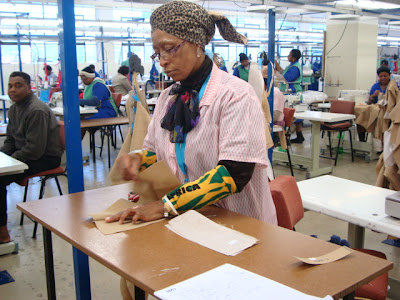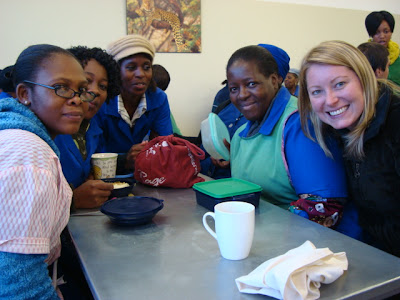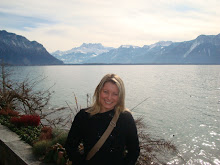Between the two companies my team was offered to work with I chose Badiramogo, along with my classmates Lars (from Norway) and Fernando (from Argentina) because the company was bigger and required more analysis. Therefore, my ten days of the consulting project were spent in a sewing factory analyzing the operations of the business to find areas where they could improve productivity and save cost.
The company was started by Ken Zerf, a white South African who had worked in clothing for more than 20 years before starting his own factory so he could run things the way he thought they should be run. His factory employed 125 workers, mostly middle aged black South African women, a few black South African men, and two Indian women.
The factory was located about 30 minutes drive from downtown Johannesburg, in a fairly dangerous suburb near the Ellis Park soccer stadium. We had to take lunches with us to eat because there were no restaurants in the area surrounding the building and it was too dangerous for us to be out walking around. Every day we were there our driver, Gino, stayed with the van at the factory, ready to drive us anywhere we needed to go at any time. The first day he parked the van in front of the building and sat in the back seat reading, staying inconspicuous but ready to move if he was accosted. On the second day Ken offered that he could park the van in the basement parking garage where it was safer, and Gino responded by saying, "Yes, sir, thank you, that would be very good because it is not so safe around here." If our defense-trained bodyguard/driver thought an area was unsafe, I was inclined to believe him.
Badiramogo had business, but not enough, and Ken was surviving week to week, never really knowing if he would be around the next month. Ken was known for producing the highest quality products in the area and for being 100% reliable. However, his costs were outpacing his revenues. We were asked to look at everything, from operations to financials, and ask as many questions as we wanted. Ken was completely open to everything we asked, but his workers were obviously very questioning of who we were and what we were doing, and they were extremely shy at first. I made it my goal to befriend them, and from the first day I made sure that Lars, Fernando and I spent breaks and lunchtime sitting in with them, trying to be accepted as one of them. While at first they were shy and it seemd that not many of them spoke English, after about three days it became obvious that almost all of them spoke very good English, and once they warmed up to us we couldn't get them to stop talking.
One of my favorite memories was a worker who was also named Rosemary who had many questions for me. Rosemary asked how old I was, and when I said 27 she asked if I was married, and when I said no, she was very surprised and then asked, "But how many children do you have?" If being 27 and unmarried was bad enough, finding out that I was 27, unmarried, with no children was unheard of. Her next question was, "why not?" I wasn't quite sure how to answer that question, but the first thing that came to mind was that I was waiting until I finished school. She nodded approvingly at this answer and it seemd to satisfy her. She ended the conversation by saying, "Well, when you have children I will come be your nanny."
The most amazing part was the bond that formed between the three people in my team and the workers. The first day they were quite wary of us, but by the fourth day they were our best friends, and asked us many times to come back to see them.
 |
| Heading to work in our MTN-sponsored van with driver. |
|
Driving through Johannesburg. |
|
This is the street my factory was on, near Ellis Park. |
|
The front entrance of the factory. It was on the third floor.
|
 |
| Looking over Ken's schedule board. |
|
First step: laying out the fabric. |
|
| 2nd step: cutting the fabric into the right shapes. |

 |
| Heading into the breakroom! |
|
| The woman next to me is also named Rosemary. |
|
Breaks and lunch are serious matters.
|
|
| Digging into food given to me by one of the workers. |
|
| Each worker had his or her personal mug at the factory. |
|
| Finshed garments waiting tobe sent out. |
|
Security is so tight that the workers had to use a finger scan to get in and out of the building. |
|
| Leaving work for the day. |

























No comments:
Post a Comment